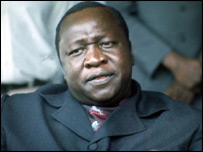Old wounds were reopened this week when the failing health of the former Ugandan military leader Idi Amin became a hot topic for media outlets across Africa.
When reports that Mr Amin, who lives in exile in Saudi Arabia, was in hospital in a coma first surfaced last Saturday, attention focused initially in Uganda on Mr Amin's state of health.
Radio Uganda, Monitor FM, and the Kampala-based, Muslim Voice of Africa radio ran the news near the top of every bulletin.
The Monitor paper had more details. "For the last three months Amin has been admitted at a Saudi Arabia hospital suffering from hypertension and 'general fatigue'... on Friday night, his condition deteriorated and he went into coma."
The paper quoted Mr Amin's "favourite wife", Nalongo Madina Amin, saying she had asked for Amin to be allowed to return to Uganda.
"She said [Ugandan President] Museveni told her that Amin had abused Ugandans' human rights and so had to answer for his sins the moment he is brought back," the paper said.
"Surely he should be allowed back home, so that if he is to die, he dies here," it reported her saying.
'Complicated case'
This question came to dominate Ugandan comment during the week: Should a very sick Mr Amin be permitted to come back to Uganda without facing trial for up to 400,000 deaths and disappearances during his rule?
The New Vision daily, which supports the government, headlined its editorial "Amin's decision".
"Amin's case is complicated", it said. "He has a lot to answer for in the minds of millions... [But] Amin has a right to return home. At the same time, all Ugandans are subject to the law."

Idi Amin fled from Uganda in 1979
|
The independent Monitor was unequivocal: "Amin has a right to live in Uganda."
"Although his regime is associated with gross human rights abuses, Amin has not been convicted of any crime since he was toppled in 1979," the paper argued.
"None of the governments that came after him has tried to extradite Amin to answer for his crimes... In the eyes of the law, the former dictator is still innocent until proven guilty!"
A commentary by Opiyo Oloya in New Vision speculated on where Mr Amin should be buried: "His death can neither be accorded the resources of the state nor the sympathy of the public."
"The most the family should expect is to be allowed, at its own expenses, to bring the body for burial in Uganda. Many Ugandans killed by Amin never even got that much."
Some Ugandan papers also tried to test public opinion.
The Monitor ran a survey, which concluded that "Ugandans want former President Idi Amin back home."
"Ugandans also want the government to give him all the benefits of a former president. In case he dies, Ugandans said Amin should be accorded a state burial at the Heroes Ground at Kololo."
'Should Amin return?'
But the lively and often bitter tone of the discussion board on the New Vision web site paints a more complex picture.
There are several dozen replies to the question, "Should Amin return?", with many contributors claiming first-hand experience of Mr Amin's brutality.
"Some of us are still bleeding with the pain and sorrow he inflicted on our families," writes one.
Another is convinced his father was killed by Mr Amin, but says proving it is difficult: "I still have not seen the solid evidence that would sway an unbiased court."
One contribution - "No-one in this forum will convince me that I should forgive and forget about Amin's atrocities to my family" - harvests several critical replies.
"Anger and vengefulness... are NEGATIVE emotions, sapping up your nervous energy", writes one.
Whilst another is sceptical about politicians in general: "Show me one Ugandan president who has not killed massive amounts."
"Let's not get stuck in history, let's try to move on."
BBC Monitoring, based in Caversham in southern England, selects and translates information from radio, television, press, news agencies and the Internet from 150 countries in more than 70 languages.

